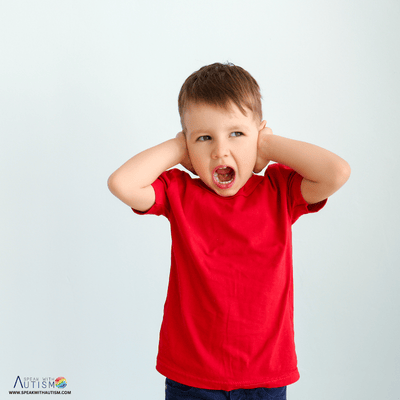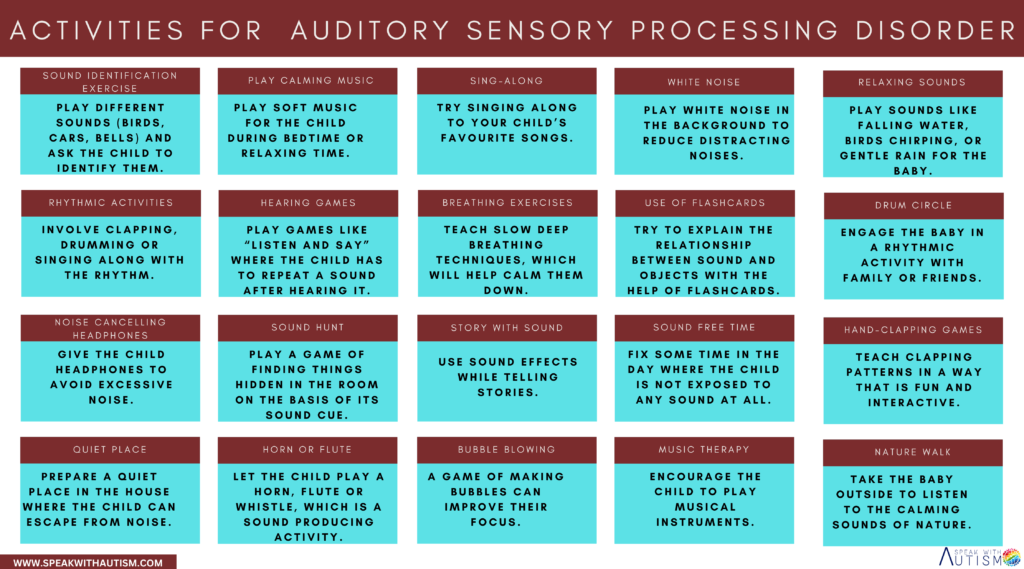Have you ever noticed that when you take your child to a party or gathering with a loud sound, he gets disturbed, cranky, or puts his hands over his ears? Sometimes a child sitting alone at home keeps humming or singing something incessantly. If this happens, it may be related to Auditory Sensory Processing Disorder (ASPD).

In today’s blog, we will understand Auditory Sensory Processing Disorder (ASPD) and discuss some powerful activities to deal with it.
Table of Contents
What is Auditory Sensory Processing Disorder?
ASPD or Auditory Sensory Processing Disorder can cause behavioral issues related to hearing. In this, the child can either be hypersensitive (highly sensitive) or hyposensitive (less sensitive).
Sensory science of hearing

Hypersensitivity:
- Getting disturbed by small sounds (like the ticking of a clock, the whistle of a mixer or cooker).
- Getting nervous, holding hands on ears or crying in loud noises (like parties, DJ).
- This noise feels like “overload” on the brain for children, which can make their behavior irritating and cranky.
Hyposensitivity:
- The child keeps humming continuously.
- Repeatedly drops things to hear the sound.
- Likes to listen to loud music.
Ways to deal with Auditory Sensory Processing Disorder

1. Gradually give sound exposure
If the child is afraid of the whistle of the cooker:
- Start by keeping the cooker away. – Give joint compression on the child’s joints (finger, elbow).
- Tell the child that the whistle is about to blow so that he is ready.
- Gradually increase the frequency and intensity of the whistle.
This will gradually make the child comfortable with the sound.
2. Sound Exploration Games
- Play with musical instruments (dholak, flute) or household kitchen items (spoons, utensils).
- Sing the child’s favorite song and gradually increase the volume.
- Give exposure to vibrational sounds (like drums).
3. Relaxation Techniques
- Apply light pressure on the child’s ears (10-15 times).
- Give joint compression to the child 2-3 times a day.
This technique will make the child feel relaxed towards the sound.
4. Social sound adoption
- Before going to a party or gathering, get children to do energy release activities (such as running, ball throw).
- Give them time to get tired and rest.
5. Vowel learning
- Record the child’s favorite song in your voice without background music.
- Play it slowly so that the child can adopt.
Why is sensory diet necessary?

Just as a nutritional diet improves the physical health of children, a sensory diet teaches children to adapt to the environment. Constant exposure and the right activities are needed to manage a condition like ASPD (Auditory Sensory Processing Disorder ). Every child is different. Understand their behavior and try to improve gradually.
Frequently Asked Questions
What is Auditory Sensory Processing Disorder?
It is a sensory disorder related to the hearing process. In this, children are either hypersensitive (highly sensitive), due to which even normal sounds bother them, or hyposensitive (less sensitive), due to which they need more loud sounds.
What is the behavior of hypersensitive children?
1. Sounds like loud music, a mixer, vacuum cleaner, or cooker whistle bothers them.
2. Children may put their hands on their ears or start crying out of irritation.
3. They try to avoid noisy places.
How do hyposensitive children behave?
Such children like loud music. They keep talking, humming, or like to listen to sounds by throwing things.
How to help hypersensitive children?
1. Gradual exposure:
If the child is afraid of the cooker whistle, first play the sound from a distance and calm them down through joint compression or massage.
Increase the exposure over time.
2. Gross Motor Exercises:
Before going to a loud place, engage children in activities like cycling, running or ball throwing.
How to help hyposensitive children?
Sound Exposure:
Give children the experience of different sounds by using drums, dholak, or kitchen utensils.
E-Learning:
Record their favorite rhymes or songs in your own voice without background music and play them.
How to prepare the child for places with loud sound?
1. Do gross motor activities at home.
2. Give breaks to calm the child.
3. Make them feel relaxed by applying light pressure on the ears.
Is sensory diet beneficial?
Yes, just like a nutritional diet is necessary for physical development, a sensory diet helps the child to adjust to the environment and handle behavioral problems. These methods will not only reduce the troubles of children but will also teach them to feel comfortable in a noisy environment.
